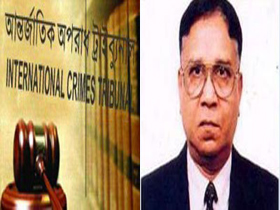Corroborating the evidence of tw0 sibling eyewitnesses, a Liberation War hero prosecution witness on Sunday accused SM Qaiser of being behind the killing of seven people, including the staff of Shayestaganj food godown on May 29 during the Liberation War in 1971.
“After lining up all the seven captives under a railway bridge over Khowai River in Habiganj, the Pakistan occupation army at the behest of Qaiser gunned them down,” recalled PW-12 Gour Prasad Roy, 68, while making his deposition before the International Crimes Tribunal-2.
“All the bullet-riddled bodies were thrown away in the mighty Khowai River by Qaiser’s Razakar cohorts,” he said.
PW Gour Prasad, who had witnessed the horrible incident from a close distance as he was hiding in an adjoining sugarcane field, also told the tribunal that he knew all the victims as he and his family had frequently visited the local food godown as miller.
Gour Prasad, now president of Habiganj unit Sector Commander Forum, also disclosed the names of the martyred people. They were Shayestaganj sub-divisional food controller Abdul Aziz, circle inspector of food Abdul Khaleq, food godown officer-in-charge Rezaul Karim, godown guards Geda Mia, Abdur Rahman and Majat Ali, and carrying contractor Tara Mia.
During the deposition, the PW also revealed another double murder incident carried out by the Pakistan occupation army at the behest of SM Qaiser. The victims were Dr Saleh Ahmed and Hirendra Nath Roy alias Hiru, local leaders of Awami League.
Before concluding his deposition, the PW identified accused SM Qaiser, who enjoys bail, in the dock, saying “we know each other for long.”
The PW will be cross-examined by the defence counsel on Monday.
On February 2, the tribunal indicted Syed Mohammad Qaiser, a former junior minister during Gen (retd) Ershad’s rule, for his involvement in crimes against humanity, including genocide in 1971 Liberation War.
On August 5 last year, responding to a petition, the tribunal granted Qaiser bail, subject to conditions, on medical and humanitarian grounds.
Septuagenarian Qaiser, a turncoat politician, was arrested on May 21 last year in connection with the war crimes case.
On November 14 last year, after perusing the formal charge with 18 counts of offences submitted by the prosecution and the relevant documents, the tribunal took cognisance of the formal charge as it found prima facie case against the accused under sections 3(2) and 4(1) (2) of the International Crimes (Tribunals) Act 1973.
According to the investigation agency, after the independence of Bangladesh, Qaiser, a former Pakistan Convention Muslim League activist, entered politics by joining BNP and subsequently became the president of Habiganj BNP.
Later, he quit BNP to join Ershad’s Jatiya Party and became state minister for agriculture in 1989. According to information, he lately joined the Liberal Democratic Party (LDP) of Col (retd) Oli Ahmed.
Qaiser, as a local Peace Committee leader during the Liberation War, had formed a vigilante group ‘Qaiser Force’ after his name comprising 500-700 of his trusted men in Habiganj and committed crimes against humanity, including genocide, in collaboration with the Pakistani occupation army.
At the latter part of the Liberation War, he fled to London and returned home after the August 1975 political changeover.
Source: UNBConnect

